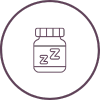Sleeping Pill Addiction | Symptoms and Effects
Sleeping pills are a range of medications that are used to treat sleeping disorders like insomnia. However, while sleeping can be very effective in helping you to get enough quality sleep, they are commonly misused and abused which can lead to addiction and a range of other health issues. Sleeping pill addiction can be incredibly difficult to overcome but if you are struggling, you should know that it is possible. Through effective professional treatment and comprehensive support, you can learn how to break free from the grip of sleeping pills addiction and reclaim your life.
What are sleeping pills?
If you struggle with falling asleep or staying asleep, sleeping pills can be a helpful solution. They work by sedating the central nervous system and decreasing brain activity.
The two most common types of sleeping pills are:
- Benzos: Although these sleeping pills have been around for many years, their side effects, high potential for addiction and withdrawal symptoms have led to some doctors and medical professionals preferring alternative medications.
- Z-drugs: These are newer sleeping pills and they typically have fewer side effects than benzos. However, they can still be highly addictive, particularly if abused recreationally or used other than prescribed.
Potentially addictive sleeping pills
Zaleplon addiction
Learn more about the signs, symptoms and effects of an zaleplon addiction.
Zolpidem addiction
Learn more about the signs, symptoms and effects of an zolpidem addiction.
Zopiclone addiction
Learn more about the signs, symptoms and effects of an zopiclone addiction.
How does sleeping pills addiction develop?
There are two main ways that you can become addicted to sleeping pills: prescription sleeping pill use and recreational sleeping pill abuse.
Prescription sleeping pill use
Some people start out taking prescription sleeping pills for a genuine sleep disorder. However, if you take them for too long or in greater quantities than prescribed, this can result in a tolerance where you require more and more to get the same effect. Eventually (and this can be a very short time for some people), you become dependent on sleeping pills and experience withdrawal symptoms when you don’t take them.
Recreational sleeping pill abuse
Other people abuse sleeping pills to get high or to soothe the symptoms of underlying mental health or emotional issues. As with prescription pill use, if you continue to take sleeping pills you will soon develop a tolerance and a physical dependence where you need them just to function “normally.”
Once you are physically dependent, sleeping pill addiction is likely to follow, especially if you have one or more of the following risk factors:
- Underlying mental health conditions
- A history of trauma
- A family history of addiction
- Ready access to sleeping pills
- A stressful or chaotic lifestyle
How sleeping pills addiction keeps people trapped
Sleeping pills addiction is a master manipulator that wants to keep you isolated and hide the reality of your condition from yourself and your loved ones. Here are some of the lies your sleeping pills addiction will tell you to try and keep you in its grip:
“Sleeping pills are legal so they can’t be addictive”
It is important to understand that the legality of a substance does not mean that it is safe. Sleeping pills can be just as addictive as illegal drugs and cause just as much damage.
“You need sleeping pills for a genuine sleep disorder”
This is another common lie your sleeping pill addiction will try to tell you, particularly if you were originally prescribed the medication. It is very important to recognise when you are no longer taking sleeping pills for a genuine medical reason, but instead to feed a sleeping pills addiction.
“You can handle it on your own”
It’s easy to believe that you can manage a sleeping pills addiction all by yourself and your condition will try to convince you of this to prevent you from getting help. However, the truth is that most people require professional help in order to overcome sleeping pill addiction. By reaching out for support, you will take the first and most important step to recovery.
Am I addicted to sleeping pills?
It is important to recognise the signs of sleeping pills addiction quickly so that you can get help before it’s too late. To help unravel the web of lies that sleeping pill addiction can weave, ask yourself these questions:
- Do I take sleeping pills automatically without first trying to fall asleep naturally?
- Do I ever take more sleeping pills than prescribed?
- Have I visited multiple doctors to get a prescription for sleeping pills?
- Have I ever experienced withdrawal symptoms when I don’t take sleeping pills?
- Have my loved ones expressed concern about my sleeping pill use?
- Do I need to take more sleeping pills than previously for them to be effective?
- Do I take sleeping pills for reasons other than insomnia, such as an escape from reality or stress relief?
- Have I stopped paying attention to other important things in my life because of my sleeping pill use?
If you answered yes to any of these questions, you may need professional help with a sleeping pills addiction. It is important that you get help as soon as possible to prevent your condition from getting worse and begin your journey to recovery.
The health dangers of sleeping pills abuse and addiction
Sleeping pill abuse and addiction can cause a number of short- and long-term health issues.
Short-term effects of sleeping pill addiction
- Impaired memory and concentration
- Dizziness, nausea and vomiting
- Sleepwalking
- Severe allergic reactions
Long-term effects of sleeping pill addiction
- Liver damage
- Respiratory depression
- Heart problems
- Weakened immune system
- Increased risk of falls and accidents due to impaired coordination or alertness
- Exacerbation of mental health issues such as depression or anxiety
- Overdose or death
Other consequences of sleeping pill addiction
In addition to the potential health problems, sleeping pills addiction can also cause significant issues in other areas of your life. These include work or school, strained interpersonal relationships and financial issues due to the increasing need for more pills as you become addicted.
Ultimately, as with all forms of drug addiction, sleeping pill addiction can cause you to completely neglect other important aspects of your life. This is why it is so important to get help before you reach this point and reclaim control over your life
How is sleeping pill addiction treated?
Effective treatment for sleeping pill addiction requires three stages, all of which are offered at Recovery Lighthouse:
- 1. Sleeping pills detox: This is where your physical dependence on sleeping pills is addressed. During this stage, you will stop taking sleeping pills until your body and brain are totally free of the substance. You may experience unpleasant withdrawal symptoms during the process but the medical and addiction experts at Recovery House will keep you safe and comfortable.
- 2. Sleeping pills rehab: This is where you will focus on the root causes of your sleeping pills addiction and build up the skills and strategies needed to maintain long-term sobriety. Recovery Lighthouse offers a range of evidence-based therapies to address every aspect of your condition and give you the best possible chance of recovery. Both detox and rehab take place in our inpatient sleeping pills addiction treatment centre where you will be shielded from potential triggers and provided with 24/7 care and support.
- 3. Aftercare: When you have finished your inpatient sleeping pills addiction treatment, Recovery Lighthouse will provide you with free aftercare services to sustain the progress you have made during rehab. This involves weekly group therapy sessions which will help to support and motivate you and provide a safe space to discuss any issues that may arise during your recovery.
Tips for helping a loved one with a sleeping pill addiction
Watching a friend or family member suffer from a sleeping pill addiction can be distressing and it can be very hard to know how to approach them with your concerns. Here are some top tips for making the conversation easier:
- Be non-judgemental: Make sure your loved one knows that you are there to help them and not to judge or criticise them.
- Be patient and understanding: Remember that addiction is a complex illness and any changes in behaviour will take time. You cannot force someone to get help so try to stay calm and help them see the light.
- Offer practical, ongoing help: Assist your loved one with arranging a visit to a sleeping pill addiction treatment centre and offer your support throughout their time in treatment and beyond.
- Explain the risks: Make sure your loved one knows that addiction to sleeping pills can be dangerous and life-threatening if not treated properly. Point out the issues that their sleeping pills addiction has already caused and the dangers if they don’t make the necessary changes now.
- Advise professional help: Encourage your loved one to seek professional help and explain why attempting to overcome sleeping pill addiction alone is so difficult.
What to do next
At Recovery Lighthouse, our dedicated team of medical professionals and therapists will provide you with the best possible chance of starting a whole new life. Contact us today for more information about our sleeping pills addiction treatment programme and we will be happy to answer any questions you have on how to get started.







